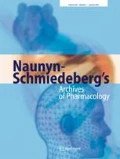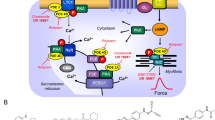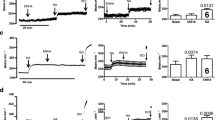Abstract.
Two forms of the activated β1-adrenoceptor exist, one that is stabilized by (-)-noradrenaline and is sensitive to blockade by (-)-propranolol and another which is stabilized by partial agonists such as (-)-pindolol and (-)-CGP 12177 but is relatively insensitive to (-)-propranolol. We investigated the effects of stimulation of the propranolol-resistant β1-adrenoceptor in the human heart. Myocardium from non-failing and failing human hearts were set up to contract at 1 Hz. In right atrium from non-failing hearts in the presence of 200 nM (-)-propranolol, (-)-CGP 12177 caused concentration-dependent increases in contractile force (–logEC50[M] 7.3±0.1, E max 23±1% relative to maximal (-)-isoprenaline stimulation of β1- and β2-adrenoceptors, n=86 patients), shortening of the time to reach peak force (–logEC50[M] 7.4±0.1, E max 37±5%, n=61 patients) and shortening of the time to reach 50% relaxation (t 50%, –logEC50[M] 7.3±0.1, E max 33±2%, n=61 patients). The potency and maxima of the positive inotropic effects were independent of Ser49Gly- and Gly389Arg-β1-adrenoceptor polymorphisms but were potentiated by the phosphodiesterase inhibitor 3-isobutyl-1-methylxanthine (–logEC50[M] 7.7±0.1, E max 68±6%, n=6 patients, P<0.0001). In the presence of (-)-propranolol and 3-isobutyl-1-methylxanthine, the potency (–logEC50[M] 7.4±0.1, P=0.0013, n=9 patients) but not the maximal effect of (-)-CGP 12177 was reduced in right atrium from failing hearts, which was associated with 64% and 52% reductions in the densities of low-affinity and high-affinity (-)-[3H]CGP 12177 binding sites. In the presence of (-)-propanolol and 3-isobutyl-1-methylxanthine, (-)-CGP 12177 increased atrial cyclic AMP levels and activated cyclic AMP-dependent protein kinase in right atrium from non-failing hearts. In right ventricle from failing hearts (-)-CGP 12177 increased contractile force (–logEC50[M] 7.4±0.1, E max 34±3%, n=13 patients) and hastened the time to peak force (–logEC50[M] 7.6±0.1) and time to reach 50% relaxation (–logEC50[M] 7.4±0.1) in the presence of (-)-propranolol and 3-isobutyl-1-methylxanthine. Our results show that (-)-CGP 12177 increases contractility and hastens relaxation through a cyclic AMP pathway in human myocardium, consistent with mediation through a (-)-propranolol-resistant state of the β1-adrenoceptor. The reduction in heart failure of atrial inotropic potency of (-)-CGP 12177, as well as of the high-affinity and low-affinity binding sites for (-)-[3H]CGP 12177, is consistent with the β1-adrenoceptor nature of these sites.
Similar content being viewed by others
Author information
Authors and Affiliations
Additional information
Electronic Publication
Rights and permissions
About this article
Cite this article
Sarsero, D., Russell, F.D., Lynham, J.A. et al. (-)-CGP 12177 increases contractile force and hastens relaxation of human myocardial preparations through a propranolol-resistant state of the β1-adrenoceptor. Naunyn-Schmiedeberg's Arch Pharmacol 367, 10–21 (2003). https://doi.org/10.1007/s00210-002-0652-9
Received:
Accepted:
Issue Date:
DOI: https://doi.org/10.1007/s00210-002-0652-9




